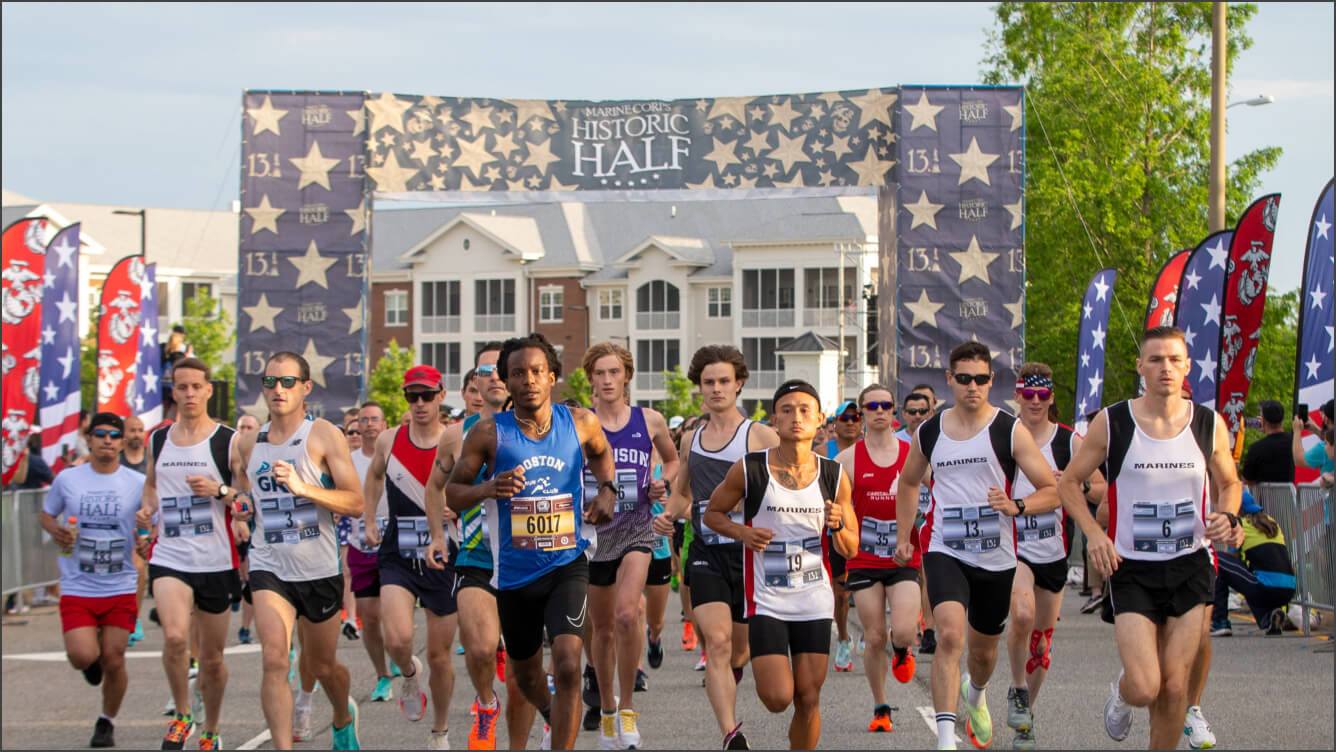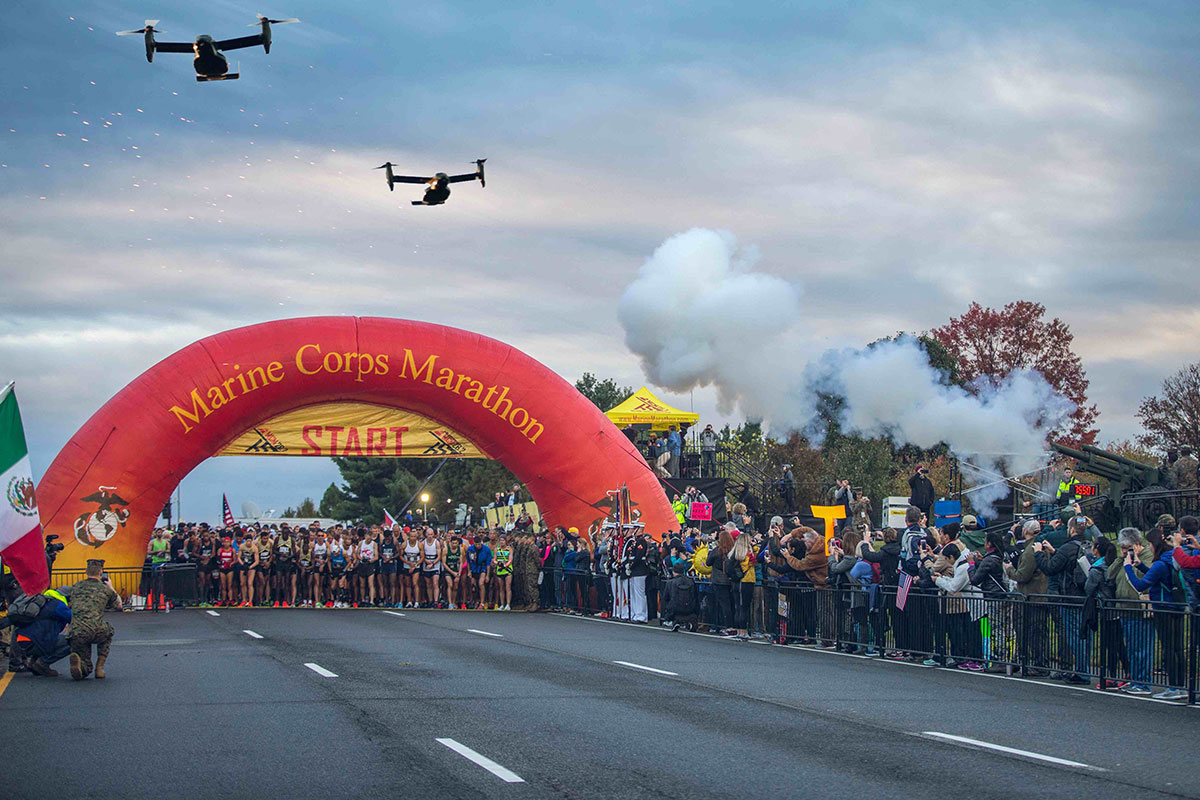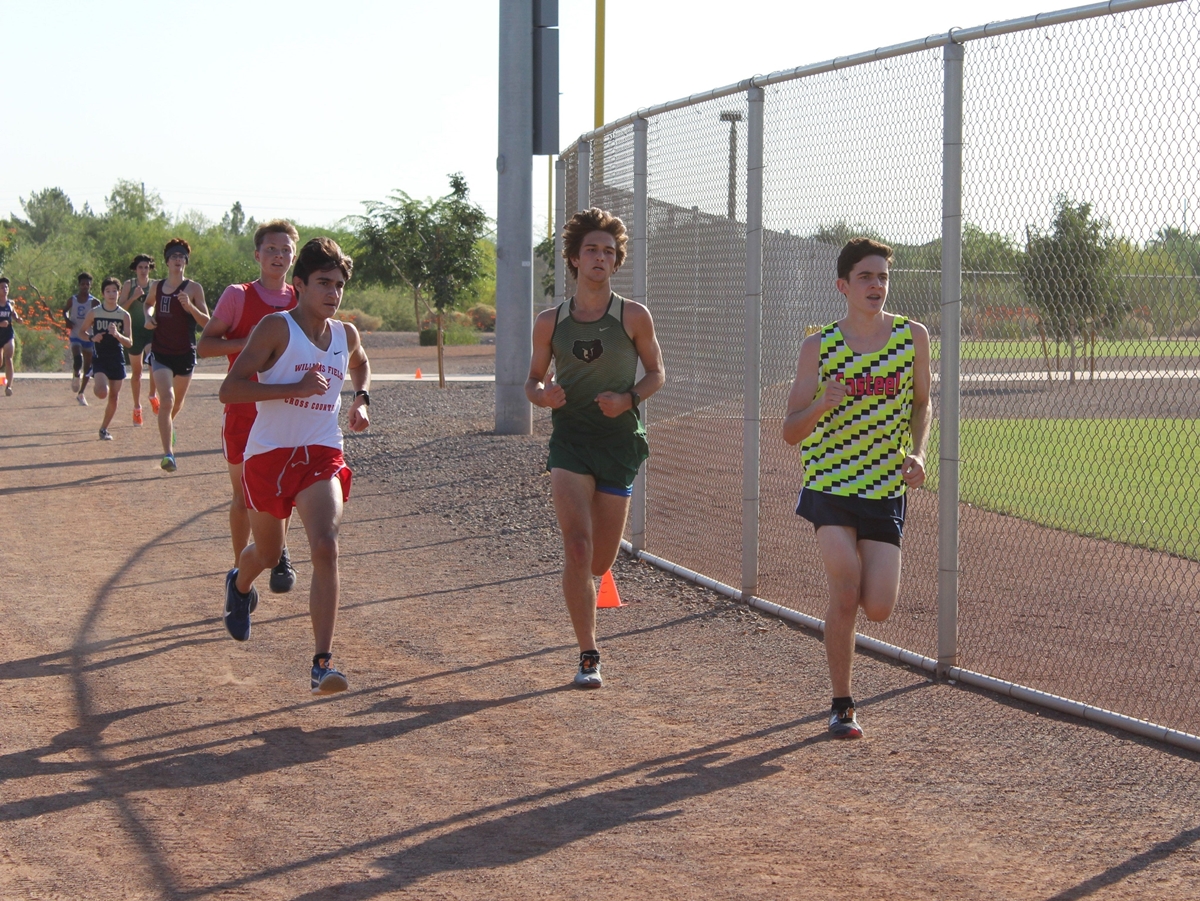Home>Misc>Featured>What Does It Take To Be A D1 Cross Country Athlete


Featured
What Does It Take To Be A D1 Cross Country Athlete
Modified: October 3, 2023
Discover what it takes to become a featured D1 cross country athlete with insightful tips and training strategies. Unlock your potential and dominate the race!
Introduction
Welcome to the world of NCAA Division 1 (D1) Cross Country! The exhilarating sport of cross country running combines endurance, speed, and mental resilience. It is an intense and challenging discipline that requires athletes to push their bodies to the limit and strive for greatness.
Being a D1 cross country runner is not for the faint of heart. It demands a high level of physical fitness, mental toughness, and unwavering dedication. In this article, we will explore what it takes to be a D1 cross country runner and the training requirements necessary to compete at this elite level.
For many aspiring runners, the dream of competing in a D1 cross country program is as lofty as it gets. The competition is fierce, and the stakes are high. D1 schools attract some of the best runners from around the country and even internationally, seeking to build competitive teams capable of contending for national titles.
As a D1 cross country runner, you will be part of a tight-knit team that pushes each other to new limits. You will compete against top-tier athletes, representing your university with pride and passion. The experiences, friendships, and personal growth that come with being a D1 athlete are unparalleled.
Throughout this article, we will delve into the physical fitness and training requirements, the mental toughness needed to endure grueling races, the dedication and commitment required to excel at this level, as well as the importance of time management, nutrition, hydration, and injury prevention.
So, lace up your running shoes, take a deep breath, and get ready to embark on an exciting journey into the world of D1 cross country running! Let’s dive in and discover what it truly takes to be a D1 cross country runner.
The Importance of Being a D1 Cross Country Runner
Being a D1 cross country runner is not just about winning races or earning accolades. It goes beyond personal achievements and represents a commitment to excellence and personal growth. Here are a few reasons why being a D1 cross country runner is so important:
- Representing your university: As a D1 cross country runner, you have the privilege of representing your university in competition. You become an ambassador for your school, showcasing its values, spirit, and athletic prowess. It’s an honor and a responsibility that instills a sense of pride and camaraderie.
- Challenging yourself: D1 cross country pushes you to your limits and beyond. It tests your physical and mental capabilities, challenging you to break through barriers and discover your true potential. Each race and workout becomes an opportunity to push yourself harder and become a stronger athlete.
- Building resilience: Cross country is a grueling sport that requires mental toughness. The long runs, painful intervals, and difficult races teach you how to overcome adversity, stay focused, and persevere. You learn to embrace discomfort and use it as fuel to keep going, both on and off the racecourse.
- Developing life skills: The discipline and dedication required to excel in D1 cross country translate into valuable life skills. Goal-setting, time management, teamwork, and leadership become second nature as you navigate the demands of training, academics, and personal responsibilities.
- Forming lifelong friendships: The bond between teammates in D1 cross country is incredibly strong. You train and compete together, share victories and setbacks, and support each other in every step of the journey. The friendships you forge amidst the challenges of cross country will last a lifetime.
- Cultivating a healthy lifestyle: Cross country demands a commitment to physical fitness and well-being. It encourages a healthy lifestyle, including regular exercise, proper nutrition, and sufficient rest. These habits extend beyond the sport and have a positive impact on your overall health and well-being.
These are just a few reasons why being a D1 cross country runner holds such significance. It is an opportunity to grow, excel, and make lasting memories. So, embrace the challenges, relish the victories, and never underestimate the impact that being a D1 cross country runner can have on your life.
Physical Fitness and Training Requirements
To compete at the D1 level in cross country, athletes must possess exceptional physical fitness and adhere to rigorous training requirements. Here are some key aspects of physical fitness and training necessary for success:
- Endurance and Stamina: D1 cross country races typically cover distances of 8K (men) and 6K (women), requiring athletes to have exceptional endurance and stamina. Long distance runs, tempo runs, and interval workouts help build cardiovascular fitness and improve the body’s ability to sustain effort over long periods.
- Speed and Agility: While endurance is crucial, D1 cross country runners also need speed and agility, especially during races when they must navigate challenging terrains and overtake opponents. Speed workouts, hill sprints, and plyometric exercises are incorporated into training to enhance sprinting ability and dynamic movement.
- Strength and Conditioning: Cross country running places significant strain on the muscles and joints. Strength training exercises, such as lunges, squats, and core exercises, are essential to build muscular strength and stability. Additionally, regular flexibility and mobility exercises help prevent injuries and enhance running form.
- Mental Toughness: Physical fitness alone is not enough; mental toughness is equally important. D1 cross country runners must have the mental fortitude to push through pain, fatigue, and challenging race conditions. Building mental resilience involves visualization techniques, positive self-talk, and mental preparation strategies.
- Dedication and Commitment: D1 cross country training is demanding and requires unwavering dedication. Athletes must commit to a consistent training schedule, attending practices, completing workouts, and maintaining a high level of discipline. Balancing academics, social life, and training requires a strong sense of commitment.
Successful D1 cross country runners prioritize their physical fitness and training regimen. They work closely with coaches and sports scientists to design personalized training programs that address their strengths and weaknesses while ensuring proper recovery and injury prevention.
It’s important to note that each coach and program may have different training approaches and requirements. However, the underlying principle remains the same – a solid foundation of physical fitness, combined with a dedicated and disciplined training routine, is essential for D1 cross country success.
Endurance and Stamina
Endurance and stamina are paramount for D1 cross country runners. These athletes need to maintain a consistent pace over a lengthy distance without succumbing to fatigue. To develop the required endurance and stamina, runners follow specialized training methods:
Long Distance Runs: Long runs form the foundation of endurance training. These runs are typically performed at a comfortable pace for an extended period, ranging from 60 to 90 minutes or more. The purpose is to build cardiovascular fitness, improve aerobic capacity, and enhance the body’s ability to sustain effort over time.
Tempo Runs: Tempo runs focus on running at a sustained efforts at a brisk pace, just below the runner’s “threshold” or the point where lactate begins to accumulate in the muscles. These runs are typically shorter than long runs but are performed at a higher intensity. They teach the body to maintain a challenging pace and improve the lactate threshold, delaying the onset of fatigue.
Interval Workouts: Interval workouts involve alternating between periods of intense effort and recovery. These workouts challenge the cardiovascular system by pushing runners to run at a high intensity for shorter bursts of time, followed by active recovery. Intervals can vary in duration and intensity, with examples including 400m repeats and 800m intervals.
Hill Training: Hills are a valuable training tool for building both strength and endurance. Hill workouts involve running uphill at a challenging pace, focusing on maintaining proper form and driving the knees. Hill work strengthens the leg muscles and forces the cardiovascular system to work harder, thus further improving endurance and stamina.
It’s important to progressively increase the distance and intensity of training runs to avoid overexertion or injury. Gradually building endurance and stamina helps prevent burnout and enables runners to adapt to the demands of longer distances and intense races.
Maintaining physical fitness outside of running is also crucial. Incorporating cross-training activities such as swimming, cycling, or weightlifting can help improve overall cardiovascular fitness, muscle strength, and reduce the risk of overuse injuries.
Furthermore, proper recovery is essential for optimizing endurance and stamina. D1 cross country runners must prioritize rest, adequate sleep, and proper nutrition to replenish glycogen stores and repair muscle tissue. Implementing recovery strategies like foam rolling, stretching, and regular sports massages can also aid in reducing muscle soreness and improving overall recovery.
By consistently following a well-rounded training regimen that includes long runs, tempo runs, interval workouts, hill training, and appropriate recovery, D1 cross country runners can build the endurance and stamina necessary to compete at the highest level of the sport.
Speed and Agility
In D1 cross country, speed and agility are critical attributes that can make a significant difference during races. To develop these qualities, athletes incorporate specific training methods into their regimen:
Speed Workouts: Speed workouts focus on developing the runner’s maximum running speed. This includes shorter intervals performed at near-maximal effort, such as 200m sprints or 400m repeats. These workouts improve neuromuscular coordination, stride efficiency, and overall running economy.
Hill Sprints: Hill sprints are an effective training tool to enhance both speed and strength. Runners sprint uphill at maximum effort, focusing on driving the knees, pumping the arms, and maintaining proper form. Hill sprints improve leg power and explosiveness, translating to increased speed on flat terrain.
Plyometric Exercises: Plyometric exercises involve explosive movements that target muscles used in running. These exercises, including box jumps, bounding, and squat jumps, develop powerful leg muscles and improve overall athletic performance. By enhancing lower body power, runners can propel themselves forward more efficiently.
Form Drills: Form drills concentrate on developing proper running form and technique. These drills include high knees, butt kicks, and A-skips, which promote a more efficient stride and improve running mechanics. By optimizing running form, athletes can minimize energy wastage and enhance overall speed.
Interval Training: While interval training primarily focuses on endurance, it also improves speed and agility. By incorporating shorter, faster intervals with active recovery, runners can increase their anaerobic capacity and improve their ability to maintain a quick pace during races. This training method helps simulate race scenarios and enhances speed endurance.
Speed and agility training for D1 cross country runners is not solely about pure sprinting. It also incorporates elements that enhance the runner’s ability to navigate challenging terrain, make quick decisions, and maintain pace during race fluctuations. This is particularly important in cross country races, as runners often encounter uneven surfaces, steep hills, and tight turns.
In addition to training methods, proper warm-up and cool-down routines are essential to prevent injury and optimize performance. Dynamic exercises, stretching, and drills specific to speed and agility prepare the body for intense efforts and help improve overall readiness for training and competition.
Nutrition is also a crucial aspect of speed and agility training. D1 cross country runners must fuel their bodies with proper nutrients to meet the demands of high-intensity workouts. Adequate carbohydrate intake before and after training helps replenish glycogen stores and supply energy, while protein aids muscle recovery and growth.
By incorporating speed workouts, hill sprints, plyometric exercises, form drills, and interval training into their training regimen, D1 cross country runners can improve their speed and agility, giving them a competitive edge during races.
Strength and Conditioning
Strength and conditioning play a vital role in the success of D1 cross country runners. Building strength, stability, and overall muscular endurance prepares athletes to meet the demands of the sport. Here are key aspects of strength and conditioning training:
Strength Training: Incorporating strength exercises into the training routine helps runners develop the necessary muscular strength to endure the physical demands of cross country. This includes exercises such as lunges, squats, deadlifts, and calf raises, which target major leg muscles. Additionally, core-strengthening exercises like planks, Russian twists, and bridges help improve stability and maintain proper running form.
Resistance Training: Resistance training with bands, weights, or bodyweight exercises adds an additional challenge to the workout regimen. It helps build muscular strength and endurance, improves stride power, and enhances overall athletic performance. Specific exercises targeting the hip flexors, glutes, and hamstrings are particularly beneficial for runners.
Plyometric Training: Plyometric exercises, which involve rapid muscle stretching and contraction, are instrumental in improving power and explosiveness. Exercises like box jumps, single-leg bounds, and lateral jumps enhance lower limb coordination, neuromuscular control, and jump-start the muscle response time needed for efficient running.
Flexibility and Mobility: Maintaining flexibility and mobility is crucial for injury prevention and optimizing running mechanics. Regular stretching exercises targeting major muscle groups, such as the quadriceps, hamstrings, and calves, help improve range of motion and reduce muscle tightness. Incorporating dynamic warm-up exercises, like leg swings and hip rotations, also enhances joint mobility and prepares the body for intense workouts.
Balance and Stability: Cross country runners require excellent balance and stability to navigate uneven terrain and maintain proper form throughout the race. Including exercises like single-leg squats, stability ball exercises, and balance board work strengthens stabilizer muscles and enhances proprioception.
In addition to strength and conditioning exercises, recovery and rest are vital components of maintaining overall physical fitness. Adequate sleep, proper nutrition, and active recovery techniques, such as foam rolling and stretching, aid in muscle repair and help prevent overuse injuries.
To determine the most effective strength and conditioning program, it is beneficial for D1 cross country runners to work closely with strength and conditioning coaches or sports scientists. These professionals can provide individualized assessments, create personalized training plans, and ensure proper lifting techniques to maximize performance and minimize the risk of injury.
By incorporating strength and conditioning exercises into their training routine, D1 cross country runners can develop the necessary muscular strength, stability, and overall endurance required to excel in the sport.
Mental Toughness
Mental toughness is a crucial trait for D1 cross country runners. The ability to push through pain, maintain focus, and stay mentally strong during races is often what sets athletes apart. Here are key elements in developing mental toughness:
Embracing Discomfort: D1 cross country races are challenging, both physically and mentally. Mental toughness requires accepting and embracing discomfort as an inherent part of the sport. Instead of shying away from pain, mentally tough runners learn to push through it, using it as fuel to keep going.
Positive Self-Talk: The mind plays a significant role in athletic performance. Mental toughness involves cultivating positive self-talk, replacing negative thoughts with motivational and encouraging statements. By maintaining a positive mindset, runners can boost confidence and stay focused on their goals.
Visualization Techniques: Visualization is a powerful tool for building mental resilience. Athletes visualize themselves running with strength, determination, and success. By mentally rehearsing races and envisioning themselves achieving their goals, runners develop confidence and mental toughness.
Mindfulness and Focus: D1 cross country runners must stay in the present moment during races, maintaining focus on their stride, breathing, and race strategy. Practicing mindfulness techniques like deep breathing, meditation, and centering helps athletes stay mentally present and avoid distractions.
Adaptability and Resilience: Mental toughness involves the ability to adapt to adverse conditions and bounce back from setbacks. Cross country races are unpredictable, with variables like weather, terrain, and competition intensity. Mentally tough runners remain resilient, quickly adjusting to unexpected challenges and learning from failures to improve.
Goal Setting: Setting clear, realistic goals and breaking them down into manageable milestones enhances mental toughness. D1 cross country runners establish both short-term and long-term goals, providing a sense of purpose and direction. Accomplishing these goals instills confidence and motivates continued perseverance.
Support System: A strong support system, including coaches, teammates, and family, is invaluable in building mental toughness. They provide encouragement, guidance, and accountability, helping runners navigate the ups and downs of training and competition.
Cultivating mental toughness is an ongoing process that requires dedication and practice. Just like physical fitness, mental toughness can be trained and developed over time. Tackling mental challenges head-on, employing positive self-talk, visualization techniques, and mindfulness practices can strengthen mental resilience in D1 cross country runners.
Mental toughness extends beyond the racecourse and has a profound impact on other areas of life. The discipline, perseverance, and problem-solving skills developed in D1 cross country carry over into academics, careers, and personal relationships.
By nurturing mental toughness, D1 cross country runners not only enhance their athletic performance but also develop the skills and mindset necessary for success in all aspects of life.
Dedication and Commitment
Dedication and commitment are fundamental traits for D1 cross country runners. Aspiring athletes must demonstrate unwavering devotion to training, competing, and personal growth. Here are key aspects of dedication and commitment in the pursuit of excellence:
Consistent Training: D1 cross country runners commit to a rigorous training schedule that spans weeks, months, and even years. They understand the importance of consistent training to build endurance, strength, and speed. Showing up for every practice, completing workouts, and following the training plan as closely as possible distinguishes dedicated athletes.
Pushing Through Challenges: D1 cross country is not without its obstacles. Dedicated runners tackle injuries, fatigue, and mental barriers head-on. They possess the resilience to push through tough workouts, overcome setbacks, and bounce back stronger than ever. Dedication is proven by the ability to persevere even when faced with adversity.
Setting and Pursuing Goals: Dedicated runners set ambitious goals and actively work towards achieving them. They identify areas for improvement, develop a plan, and strive for continuous progress. Whether it’s lowering race times, improving personal records, or earning All-Conference honors, committed athletes are driven by a desire for constant growth and self-improvement.
Commitment to Team: D1 cross country is not an individual sport, but a team endeavor. Dedicated runners understand the importance of supporting and encouraging their teammates. They foster a positive team environment, celebrate collective successes, and lend a helping hand when needed. Commitment to the team extends beyond personal achievements and fosters a sense of unity and camaraderie.
Time Management: Balancing academics, training, and personal life requires exceptional time management. Dedicated D1 cross country runners prioritize their commitments, ensuring they allocate sufficient time for training, studying, and rest. Efficiently managing responsibilities demonstrates commitment to both athletic and academic endeavors.
Embracing Sacrifices: Being a D1 cross country runner often requires sacrifices. Social events, leisure activities, and personal time may need to take a backseat to training and competition. Dedication involves recognizing and accepting these sacrifices as necessary for achieving long-term goals and success.
Continuous Learning: Dedicated athletes have a growth mindset and seek opportunities for learning and improvement. They embrace feedback, analyze race performances, and actively seek ways to refine their running technique and training methods. Dedication involves a hunger for knowledge and a willingness to adapt and evolve in the pursuit of excellence.
Dedication and commitment in D1 cross country extend beyond the physical aspects of training. They encompass mental, emotional, and social aspects of an athlete’s life. The journey requires sacrifices, resilience, and the ability to overcome obstacles. However, the rewards of dedication and commitment include personal growth, self-discovery, and the ability to achieve aspirations beyond the realm of sports.
By embodying dedication and commitment, D1 cross country runners set themselves up for success on and off the racecourse. The dedication they demonstrate in their athletic pursuits shapes their character and serves as a foundation for future achievements.
Time Management Skills
Time management is essential for D1 cross country runners who juggle the demands of training, academics, and personal obligations. Effective time management skills ensure that athletes allocate sufficient time to each aspect of their lives without compromising their goals or well-being. Here are key elements of time management for D1 cross country runners:
Prioritization: D1 athletes must prioritize their responsibilities and commitments. They identify the most important tasks and allocate time accordingly. Prioritization ensures that training, academic assignments, and other obligations receive the attention they require.
Creating a Schedule: A well-structured schedule provides a framework for managing time effectively. D1 cross country runners create schedules that include designated training times, study periods, rest, and social activities. They understand the value of planning and adhering to a structured routine.
Goal-Oriented Planning: Time management is more effective when aligned with goals. D1 athletes set specific goals for their running performance and academic achievements. They break down these goals into smaller, actionable steps and allocate time for working towards them. Goal-oriented planning ensures that time is spent purposefully and moves them closer to their objectives.
Efficient Study Techniques: D1 cross country runners need to optimize their study time. Effective study techniques, such as active reading, creating study schedules, and utilizing mnemonic devices, can enhance the learning process and reduce time wastage. They prioritize coursework, complete assignments in a timely manner, and seek help when needed.
Sleep and Rest: Adequate rest and sleep are crucial for recovery and optimal performance. D1 athletes prioritize quality sleep and understand that it is essential for physical and mental well-being. They establish consistent sleep patterns and ensure they allocate enough time for rest to support their training and academic efforts.
Minimizing Time Wasters: D1 cross country runners are mindful of time-wasting activities that distract from their goals. They minimize screen time, limit social media use, and avoid excessive leisure activities that do not contribute to their success. By reducing distractions, they optimize their productivity and make the most of their available time.
Flexibility and Adaptability: D1 athletes understand that unexpected circumstances can arise. They embrace flexibility and adapt their schedules when necessary. Whether it’s adjusting a training session due to inclement weather or reorganizing study time to accommodate an academic event, they remain adaptable while maintaining their overall time management structure.
Seeking Support: Time management can be challenging, and D1 cross country runners know the importance of seeking support when needed. They communicate with coaches, teammates, and instructors, seeking guidance or assistance to manage their time effectively. They understand that seeking support is not a sign of weakness, but a step towards achieving balance and success.
Effective time management skills ensure that D1 cross country runners can excel both academically and athletically without feeling overwhelmed or burnt out. By implementing strategies such as prioritization, scheduling, goal-oriented planning, efficient studying, and remaining adaptable, athletes can create a balanced and fulfilling lifestyle.
Time management skills learned in the realm of D1 cross country extend beyond the athletic field and academia. These skills are invaluable in future endeavors, helping athletes navigate the demands of careers, relationships, and personal aspirations.
Nutrition and Hydration
Nutrition and hydration are key factors in the performance and overall well-being of D1 cross country runners. Proper fueling and hydration support training adaptations, recovery, and endurance. Here are important aspects of nutrition and hydration for D1 cross country runners:
Balanced Diet: D1 athletes require a well-balanced diet that includes carbohydrates, proteins, healthy fats, vitamins, and minerals. Carbohydrates act as the primary fuel source during training and races, while proteins support muscle repair and growth. Healthy fats provide long-lasting energy and support overall health. A varied and nutrient-rich diet helps meet the energy demands of intense training.
Pre-Training/Race Fueling: Eating a meal or snack containing carbohydrates, proteins, and a small amount of healthy fats before training or a race is essential. This pre-fueling meal helps replenish glycogen stores and provides sustained energy. Timing is crucial to avoid discomfort, so athletes should aim to eat 1-2 hours before exercise.
Recovery Nutrition: After training or racing, proper nutrition promotes effective recovery and minimizes muscle soreness. Consuming a combination of carbohydrates and proteins within 30-60 minutes post-exercise helps replenish glycogen stores and supports muscle repair. This may include a recovery shake, a balanced meal, or a combination of snacks containing the necessary nutrients.
Hydration: Staying properly hydrated is crucial for optimal performance and overall health. Adequate fluid intake ensures that D1 cross country runners maintain proper body temperature, cardiovascular function, and joint lubrication. Athletes should drink water consistently throughout the day, and during training or races, they must replenish fluids lost through sweat. Sports drinks may be beneficial for longer workouts to replace electrolytes.
Post-Training/Race Rehydration: After workouts or races, D1 athletes should prioritize rehydration by consuming fluids containing electrolytes. This helps restore the body’s fluid balance and aids in recovery. Monitoring urine color can provide an indication of hydration status – clear to light yellow urine indicates proper hydration, while dark-colored urine may signal dehydration.
Meal Planning: Planning meals and snacks in advance can help ensure that D1 cross country runners consume balanced nutrition throughout the day. This includes incorporating a variety of fruits, vegetables, whole grains, lean proteins, and healthy fats into meals. Meal planning enables athletes to meet their calorie and nutrient needs while accommodating their training schedule and any dietary restrictions or preferences.
Supplementation (if needed): While a well-balanced diet should provide all necessary nutrients, some D1 athletes may require supplementation based on individual needs and blood work analysis. It’s important to consult with a registered dietitian or sports nutritionist to determine specific supplement needs, if any.
Proper nutrition and hydration are essential components of a D1 cross country runner’s training and performance. Working with a registered dietitian or sports nutritionist can ensure personalized guidance based on individual needs, goals, and dietary considerations.
By fueling their bodies with the right nutrients and staying hydrated, D1 cross country runners can enhance their performance, support their training adaptations, and promote overall health and well-being.
Injury Prevention and Recovery
Injury prevention and recovery are crucial aspects of training for D1 cross country runners. By implementing strategies to prevent injuries and practicing proper recovery techniques, athletes can maintain their health, optimize performance, and minimize setbacks. Here are key elements of injury prevention and recovery:
Warm-up and Cool-down: Proper warm-up routines are vital for preparing the body for intense exercise. Dynamic warm-up exercises, including jogging, lunges, and leg swings, increase blood flow, raise body temperature, and enhance muscle flexibility. Cool-down exercises, such as light jogging and static stretching, help to gradually reduce heart rate, lower body temperature, and prevent muscle tightness.
Strength and Stability Training: Strengthening muscles and improving stability can reduce the risk of injuries. Incorporating strength training exercises that target major muscle groups, with a focus on the core and lower body, helps create a stable foundation. Exercises like single-leg squats, walking lunges, and balance drills enhance muscle strength, joint stability, and overall body control.
Proper Running Form: Maintaining proper running form is essential for injury prevention. D1 cross country runners should focus on posture, arm swing, stride length, and foot strike. Engaging in drills that emphasize technique, such as high knees or butt kicks, can reinforce efficient running mechanics and reduce the risk of overuse injuries.
Gradual Progression: Gradually increasing training volume and intensity mitigates the risk of overuse injuries. D1 athletes should follow a progressive training plan that allows sufficient time for adaptation and recovery. Too much training load without appropriate rest and recovery can lead to fatigue, burnout, and increased susceptibility to injuries.
Rest and Recovery: Proper rest and recovery are critical for injury prevention. D1 cross country runners should listen to their bodies and prioritize adequate sleep to support muscle repair and overall well-being. Integrating rest days, active recovery, and light cross-training activities can help reduce the risk of overtraining and injuries.
Incorporating Cross-Training: Cross-training activities like swimming, cycling, or elliptical training can provide a break from the repetitive impact of running. These activities help maintain cardiovascular fitness, build strength, and improve overall fitness without placing excessive stress on the body.
Seeking Professional Guidance: D1 cross country runners should consult with sports medicine professionals, physical therapists, or strength and conditioning coaches who specialize in running mechanics. They can provide expert guidance, conduct gait analysis, and offer exercises or treatments tailored to address individual weaknesses or imbalances that may contribute to injury risk.
Early Intervention: In the event of an injury, early intervention is crucial. Ignoring warning signs or trying to train through pain can exacerbate injuries and lead to longer recovery periods. D1 cross country runners should seek prompt medical evaluation and follow the recommended treatment plan to facilitate a faster and more effective recovery.
Rehabilitation and Rehabilitation: Proper rehabilitation and rehabilitation protocols play a crucial role in recovering from injuries. Adhering to prescribed rehabilitation exercises, following a gradual return-to-running plan, and staying consistent with physical therapy or rehabilitation appointments can help athletes regain fitness and prevent the recurrence of injuries.
By implementing strategies for injury prevention and practicing proper recovery methods, D1 cross country runners can minimize the risk of injuries and maximize their performance potential. Prioritizing rest, recovery, and seeking professional guidance when needed are key components in maintaining long-term health and achieving success in the sport.
Conclusion
Becoming a D1 cross country runner requires a unique combination of physical fitness, mental toughness, dedication, and time management skills. The journey of a D1 athlete is filled with challenges, triumphs, and personal growth. By understanding and embracing the key components of being a D1 cross country runner, athletes can set themselves up for success on and off the racecourse.
From the importance of representing their university with pride to developing endurance, speed, and strength, D1 cross country runners must prioritize physical fitness and training requirements. Endurance and stamina are honed through long runs, tempo runs, and interval workouts, while speed and agility are enhanced through speed workouts, hill sprints, and plyometric exercises.
Mental toughness is a critical aspect that enables athletes to push through discomfort, maintain focus, and adapt to the challenges they face on the racecourse. Dedication and commitment are fundamental traits that drive the training and personal growth of D1 runners, while strong time management skills ensure they balance their academic responsibilities, training, and personal lives effectively.
Nutrition and hydration play vital roles in supporting training adaptations, recovery, and overall performance. Proper fueling and hydration are essential for D1 cross country runners to meet the energy demands of intense training. Injury prevention and recovery strategies are imperative to maintain health, optimize performance, and minimize setbacks. By practicing safe training techniques, focusing on form, and implementing proper recovery and rehabilitation protocols, athletes can reduce the risk of injuries and stay on track towards their goals.
Being a D1 cross country runner is a journey that goes beyond the sport itself. It is about personal growth, resilience, and developing life skills that extend far beyond the racecourse. The dedication, discipline, and perseverance required to excel in D1 cross country lay the foundation for future success in various aspects of life.
So, aspiring D1 cross country runners, lace up your shoes, embrace challenges, and keep pushing boundaries. With the right training, mindset, and support, you can embark on an unforgettable journey and realize your dreams of becoming a D1 cross country runner.








